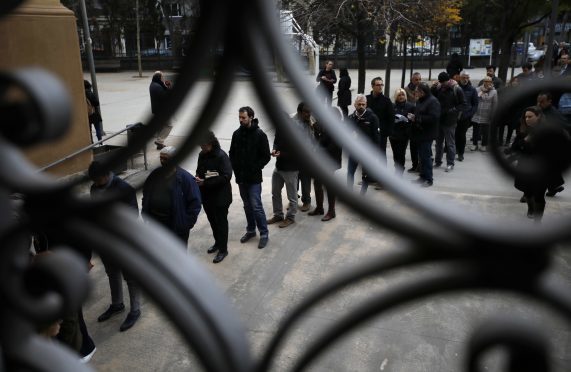If this is a revolution, then it is a quiet one. Barcelona went to the polls yesterday with all the excitement of a trip to the shops.
No drums were beaten, no horns blown – Catalonia decided its future calmly.
The last poll on October 1 had seen Spanish police manhandle and hit voters – a physical display of all that is wrong with Madrid rule, say nationalists.
Outraged at Madrid’s crack down after the last vote, nationalist Catalans took to protesting in Place de Sant Jaume.
There was no sign of high emotion there yesterday, as children played in the winter sun beneath a large christmas tree glistening with baubles.
This time there has been no reported violence or drama, just the steady flow of people into well-managed polling stations.
“It is so different from last time” Anna Mundet Molas, a pro-independence supporter, tells me as she watches people vote under the Christmas decorations at the Cervantes School in central Barcelona.
Observers from the ERC, the nationalist party likely to come out top, say that more than 50% of the electorate cast their votes by noon, a sign that this election will have a high turnout.
Barcelona is not a city be-decked with posters or flags. It is as if the population have toned their emotions down from the violence of two months ago.
The atmosphere in the Cervantes School was relaxed – people queued patiently to vote, then hung around chatting to friends.
“It’s is going well” Miguel Beso Ntrera said. “There have been no problems.”
With polls showing nationalist and unionists neck and neck, there might be long negotiations to agree who forms the next regional government.
“It may go on for a long time,” said Ms Mundet Molas, “until we know who the government is – it will come down to which way the radical left decide to go.”
Of the seven parties con restrung the vote, Podemos and the Greens have formed an alliance of radicals who claim to be unaligned on the constitutional question.
The result in terms of seats won and a government formed matters, but so does the share of votes between nationalist and unionist parties.
Ms Mundet Molas said: “What matters is if we (pro-nationalist parties) get over 50% of the vote – then we have won legitimacy in the eyes of the rest of Europe.”
The nationalist believe that Madrid and the EU will find it impossible to deny Catalonia’s claim to sovereignty if more than half of voters at this election opt for independence parties.
That would present a major challenge to the Spanish state and also undermine the EU’s model of big states.
The batons rained down at some polling stations in October because the vote was illegal and Madrid wanted to stop the referendum on independence.
It was a clumsy response to a well-intentioned effort at democratic choice, and provoked international outcry.
Madrid followed up by imprisoning the nationalist leaders, dissolving the regional government and calling this snap election.
Everyone I spoke to understood this election was a referendum of sorts on Catalonia’s future, but few believed there would be a clear outcome.
Since October, the nationalist have signaled they would rather negotiate a new settlement for Catalonia than declare freedom.
There is concern about political upheaval damaging the economy, and few have an appetite for violence.
Observers say the election will be swung by the suburbs of Barcelona, traditionally apathetic about local politics. These communities are dominated by people from others parts of Spain who have settled in the rich northern region of Catalonia. If they do come out to vote, then the unionists may win the day.
However, this does echo talk of the “missing million” in the Scottish electorate and how they would swing things for the Yes camp in 2014, something which did not materialise on voting day.

